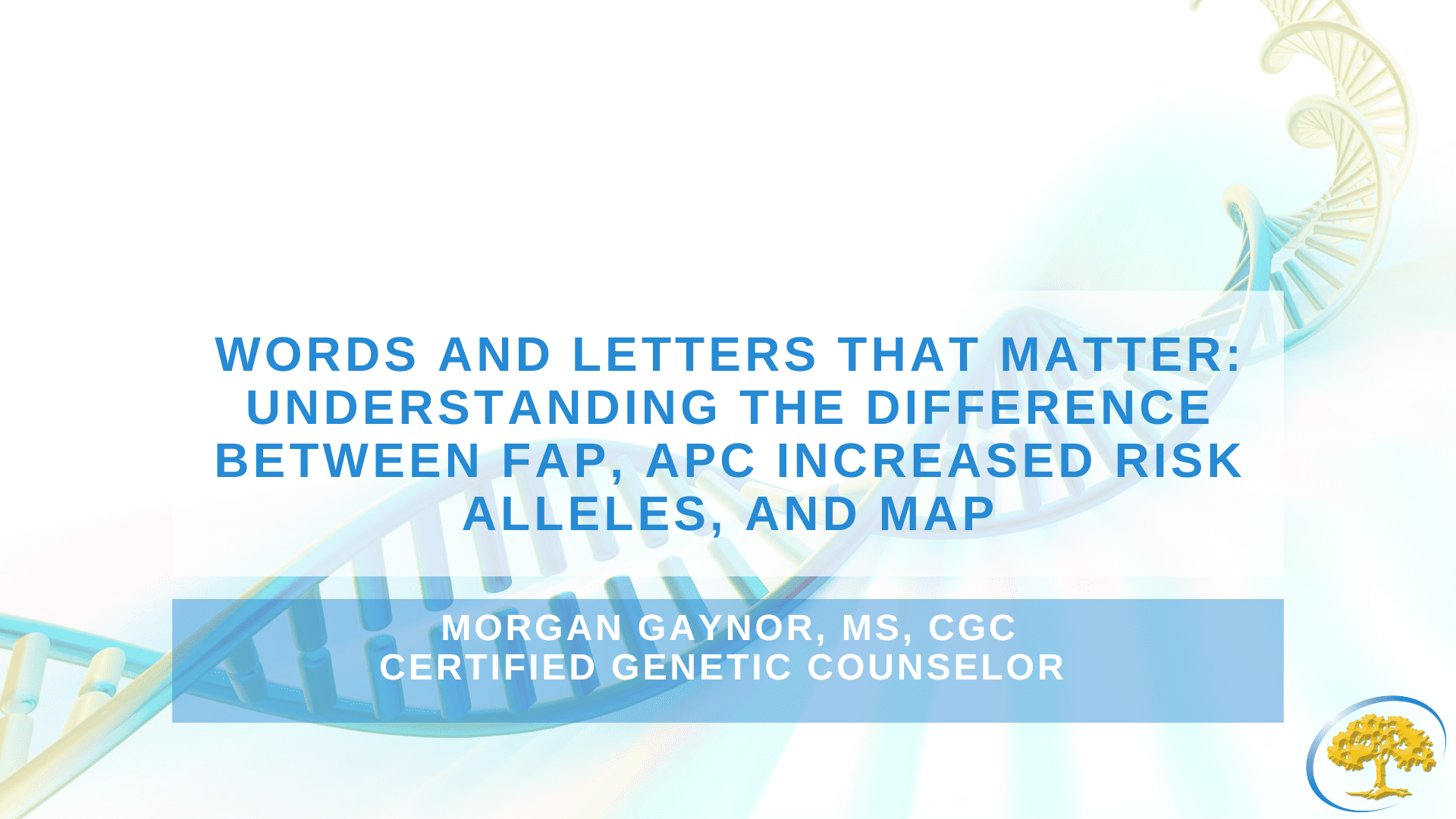
Posted 4 months ago
Words and Letters That Matter: Understanding the Difference between FAP, APC increased risk alleles, and MAP
When it comes to genetics, small differences can mean a lot for your health. This is especially true when talking about APC mutations, APC increased risk alleles, and other hereditary colorectal cancer syndromes. But not all genetic changes mean the same thing—or even the same level of risk. Let’s break it down.
When certain changes occur in the APC gene, it can lead to a higher risk of developing colorectal cancer. But there’s a difference between having an increased risk allele and a full APC mutation. Increased risk alleles are common variations in the APC gene that slightly raise your risk of colorectal cancer. People with increased risk alleles in the APC gene are usually recommended to start colonoscopies earlier than the general population at age 40 and repeat every 5 years. The APC increased risk allele is not associated with familial adenomatous polyposis (FAP).
On the other hand, a full pathogenic mutation in the APC gene can cause familial adenomatous polyposis (FAP). FAP is a rare condition where hundreds of precancerous polyps can develop in the colon, usually starting in teenage years. FAP carries a near-100% risk of colorectal cancer by middle age if untreated. Individuals with FAP often undergo intensive screening starting in childhood. This usually consists of a colonoscopy or sigmoidoscopy as early as 10–12 years old, and potentially the removal of the colon (colectomy) in the late teens or early 20s to prevent cancer. They are also at risk for other cancers, including duodenal, thyroid, hepatoblastoma (a rare liver cancer) in children, and, less commonly, pancreatic cancer. Additional screening such as an upper endoscopy to monitor the stomach and duodenum, as well as thyroid ultrasounds for thyroid cancer are usually recommended.
Another important distinction to point out is the difference between the conditions, “FAP” and “MAP”. Despite the similarity in their acronyms, FAP and MAP require very different approaches to management, as they carry their own unique cancer risks and types. MUTYH-Associated Polyposis (MAP) happens when you inherit two mutated copies of the MUTYH gene (one from each parent). This condition can lead to the growth of tens to hundreds of polyps in the colon. There is also an increased risk for extracolonic polyps and cancers, including duodenal cancer in individuals with MAP. Additional screening such as an upper endoscopy to monitor the duodenum, as well as an annual physical exam are usually recommended between the ages of 30-35.
If you have questions about colorectal cancer or other hereditary cancer predisposition syndromes, please speak to your Ironwood provider about a referral to Ironwood’s Genetic Services department.

Certified Genetic Counselor
Morgan Gaynor Joined Ironwood Cancer & Research Centers in May 2022. She Earned Her B.S. In Molecular Biology and Genetics from Regis University and Earned Her M.S. In Genetic Counseling from the University of Arizona.
During Her Time at The University of Arizona, Morgan Completed a Two-Year Graduate Program and a Thesis on Best Practices in Counseling Low-Level Pathogenicity Results in Cancer Genetics Settings. She Completed Clinical Rotations at Prominent Healthcare Systems Such as Banner, Mayo Clinic, Color Genomics, Phoenix Children’s Hospital, And Dignity Health. During Her Time at These Institutions, She Gained Experience in Prenatal, Cancer, Cardiology, Pediatrics, And Pharmacogenomics Counseling.
Morgan Enjoys Running, Swimming, Cycling, Playing Piano, Hiking, And Spending Time with Her Family.
Please ask your Ironwood Cancer & Research Centers doctor for a referral to see our genetic counselor.
